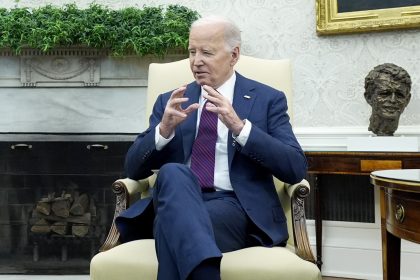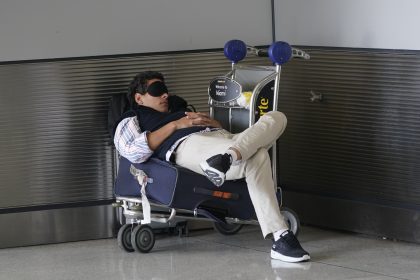First Coronavirus Death in U.S. Heightens Fears

LOS ANGELES — The death of a man in Washington state from the new coronavirus marks a milestone in the country’s fight against a disease that has already killed thousands around the world and points to the increasing likelihood of a deadly national outbreak, experts said.
For months, U.S. officials have watched nervously as cases of COVID-19 mounted in China, where the virus originated, and warned the illness could begin spreading here. On Saturday, officials announced the nation’s first fatality: a man who appears to have caught the virus in his community, a sign that the virus has begun spreading locally.
“We are facing a historic public health challenge,” Dr. Nancy Messonnier, the director of the National Center for Immunization and Respiratory Diseases within the Centers for Disease Control and Prevention, said in a call with reporters Saturday. “While we still hope for the best, we continue to prepare for this virus to become more widespread in the U.S.”
In addition to 62 cases of COVID-19 in the U.S. linked to travel abroad, officials have announced that eight people, all on the West Coast, appear to have contracted the virus in their communities. An outbreak at a long-term care facility in Washington is expected to push that total higher in the coming days, officials said.
Though federal officials say the risk to the American public remains low, the latest developments raise the possibility that the virus will become entrenched in the U.S. and impossible to contain. Closing schools and canceling events could become a public health necessity in communities where the virus takes hold, officials said.
For most people, COVID-19 causes a mild sickness, and some who are infected do not even know they are sick. The virus has been estimated to kill two of every 100 people who contract it, though the risk is lower for younger people and higher for the elderly, experts said.
The swift sweep of the virus, first in China and now in South Korea and Italy, raises alarm about how quickly infections could spread in the United States in the coming months.
“I think we’re going to see many more deaths,” said Lawrence Gostin, the director of the World Health Organization Collaborating Center on National and Global Health Law. “You just have to look at the pattern of transmission in other countries and the rapid spread — going from a few cases in Korea and Iran to thousands, and then multiple thousands. There’s no reason the virus is going to behave any differently in the U.S.”
Officials said Saturday that the man who died in Washington state was in his 50s and had underlying health conditions. Officials said they do not know how he became ill, though he was admitted to EvergreenHealth Medical Center outside Seattle at the same time as at least one of the other COVID-19 patients in Washington.
Washington Gov. Jay Inslee announced a state of emergency Saturday to respond to the outbreak. Seattle-area officials said they would consider canceling public events if the situation worsened but asked residents meanwhile to wash their hands and stay home if they had symptoms of respiratory illness.
“It is a sad day in our state as we learn that a Washingtonian has died from COVID-19,” Inslee said in a statement. “Our hearts go out to his family and friends. We will continue to work toward a day where no one dies from this virus.”
In a news conference Saturday, President Trump stressed that “there is no reason to panic” and that the risk to the general public remains low. At the same time, he announced new restrictions on travelers from Iran as well as additional screenings of those coming from Italy and South Korea, where there has been a jump in infections. He discouraged people from traveling to those countries.
Dr. Anthony Fauci, the director of the National Institute of Allergies and Infectious Diseases, appeared alongside Trump and agreed limiting travel was important. He sought to reassure the public that the government is marshaling all available resources to combat the spread of the virus in the U.S.
“The country as a whole still remains at low risk, but this is an evolving situation,” he said. “There will be additional cases, but we should not be surprised by that. The challenge is how we deal with it.”
The outbreak at Life Care Center, a long-term care facility in the Seattle suburb of Kirkland, is a major concern because of the vulnerable patients who live there, experts said. A staff member in her 40s has been hospitalized with COVID-19, as has a resident in her 70s who is in serious condition, said Seattle and King County public health officer Dr. Jeffrey Duchin.
Additionally, 27 residents and 25 staffers have symptoms such as pneumonia or other respiratory problems that match up with COVID-19, Duchin said. With 108 residents and 180 staffers at the facility in total, more people will probably test positive, he said.
“We are very concerned about an outbreak in a setting where there are many older people,” Duchin said in a call with reporters Saturday.
Duchin said a 10-member CDC team traveling to Washington on Saturday would conduct a meticulous investigation in search of the source of the coronavirus in Kirkland. Members of the team, which may grow, will also determine who came in contact with the patients subsequently diagnosed with the illness.
The team will help identify, isolate and test Life Care residents who may be at risk, Duchin said. Residents will remain at the facility unless they need hospitalization, he said, but will be segregated according to symptoms. “No mixing people who are sick with people who are not sick,” he said.
Gostin, who is also a professor at Georgetown University, said the large numbers of cases in high-density settings in other countries suggested there would be outbreaks at places such as long-term care facilities.
“We’ve seen it in hospitals in Korea, we’ve seen it in churches in Korea … in pilgrimage places in Iran; we’ve seen it in prisons in China, in nursing homes … all of those places you’re seeing very rapid transmission,” Gostin said. “You just have to look through the window.”
The rise in patients in the U.S. diagnosed with COVID-19 in recent days is probably due in part to increased testing. Before last week, doctors were not allowed to order the tests, of which there is a limited supply, for patients who did not have a history of travel to China or close contact with someone who had traveled there. Physicians can now order tests for people who are hospitalized and very ill but have no travel history.
“If we had the ability to test earlier, I’m sure we would’ve been able to identify patients earlier, particularly at hospitals,” Duchin said.
Experts said the virus is most likely to start spreading in coastal hubs of international travel. San Francisco, New York and Los Angeles typically receive the most passengers flying from Wuhan, China, where the outbreak began, on a daily basis.
In California, there are now three COVID-19 patients who did not recently travel outside the U.S. or come in contact with someone who did. The state’s health department recently announced eight testing labs that can handle coronavirus, in Los Angeles, Orange, Ventura, San Diego, Contra Costa, Alameda, Santa Clara and Tulare counties. Officials also announced the arrival of 1,200 testing kits from the federal government.
The most recent California patient, announced Saturday, is a woman described as “a household contact” of a Santa Clara County patient who has underlying health conditions and whose diagnosis was made public Friday. The county’s health department is working to identify any people the Santa Clara County woman may have come into contact with who may be at risk, officials said.
The other California patient is a woman who was hospitalized at UC Davis Medical Center in Sacramento and marked the first announced case of community spread in the country. The case led to 124 nurses and healthcare workers at the hospital being asked to self-quarantine, according to the California Nurses Assn.
Officials said it’s inevitable more test results will come back positive.
“Definitely we will have more cases here,” said Dr. Peter Beilenson, Sacramento County’s director of health services. “You shed virus before you are symptomatic, so it’s already out of the bag in a lot of ways. It’s going to spread, it’s just going to spread.”
Karlamangla and Wigglesworth reported from Los Angeles, and Read from Seattle.
———
©2020 Los Angeles Times
Visit the Los Angeles Times at www.latimes.com
Distributed by Tribune Content Agency, LLC.
























